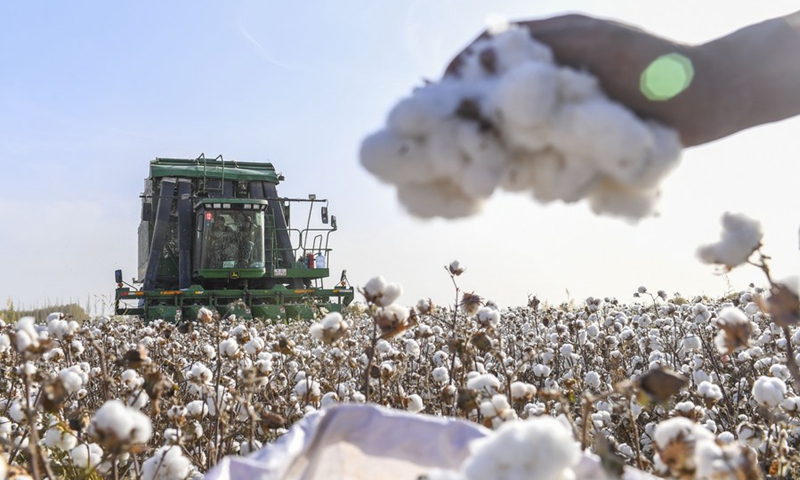
A cotton picking machine moves in a cotton field in Dolatbag Town of Bachu County, northwest China's Xinjiang Uygur Autonomous Region. File photo: Xinhua
Erke, a leading domestic clothing maker, has started producing goods in Northwest China's Xinjiang Uygur Autonomous Region, as more companies, including US electric carmaker Tesla, increase their presence in the region, shrugging off a US crackdown.
Erke announced on its official Sina Weibo account that its production base in Xinjiang went into operation on Monday.
"We will use premium cotton in Xinjiang to produce premium products. Let's sew together," the brand announced.
The manufacturing base boasts 120 production lines and will create 4,000 jobs, according to the company.
Xinjiang, as China's largest production base of long-staple cotton, has been a supplier of high-quality cotton for the world and has always adhered to high standards when selecting raw materials, which is why the company has chosen to set up the production base in Xinjiang, Erke said.
The announcement was supported by a vast number of Chinese netizens and began to trend online. The topic regarding Erke's Xinjiang production base had been reposted nearly 10,000 times and gained over 30,000 likes as of press time.
"I will support Xinjiang cotton and support domestic brands," commented one netizen known as Wangbu.
"It is a really good move to drive the economy and create more jobs in Xinjiang," commented another netizen known as zuihaiyuesheng.
Erke is the latest company to set up facilities and increase investment in Xinjiang.
On December 31, US carmaker Tesla opened its first showroom in Xinjiang. Tesla has built and opened seven super-charging stations and 36 super-charging piles in Xinjiang, the company said.
It is expected that more companies will invest in Xinjiang due to its abundant natural resources and industrial advantages, experts said.
"Xinjiang is a promising land that has yet to be fully explored," Cong Yi, a professor from the Tianjin University of Finance and Economics, told the Global Times on Tuesday.
Cong said that Xinjiang has rich reserves of natural resources and a developed production system of agricultural and sideline products, including cotton.
Moreover, many industries in Xinjiang have achieved modernization and mechanized operation, and are moving toward a transformation involving new energy, new technologies and innovative industries, Cong said.
During the 14th Five-Year Plan period (2021-25), Xinjiang will focus on developing 10 key industries, including petroleum and petrochemicals, coal and related chemicals, electric power, textiles and clothing, electronic products, fruit and forestry, processing of agricultural and sideline products, and wine and tourism.
It will also promote the integrated development of the primary, secondary and tertiary industries, according to media reports.


